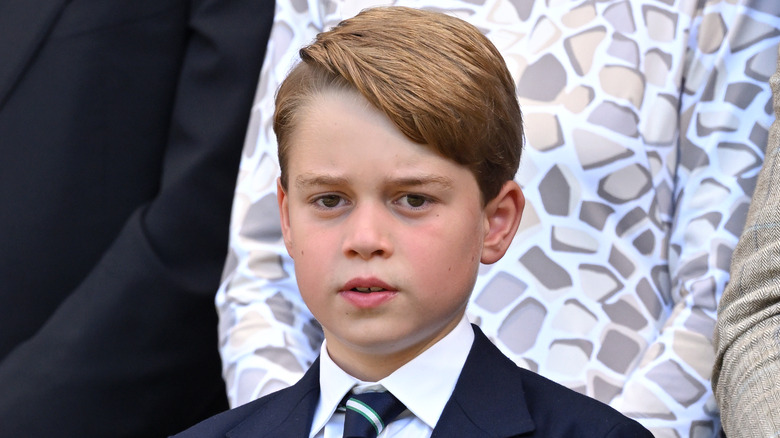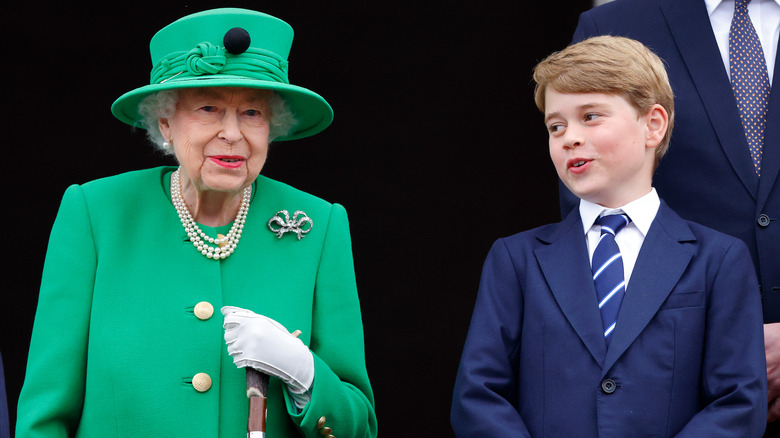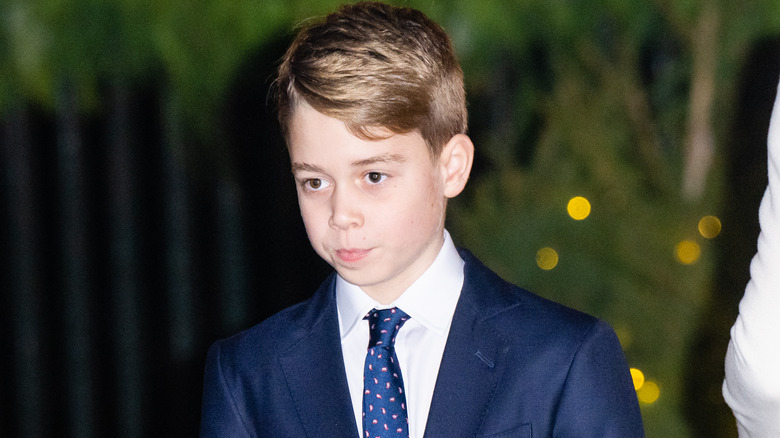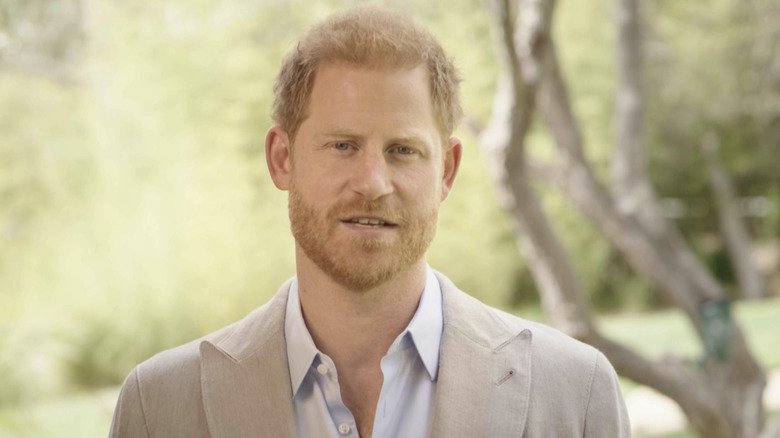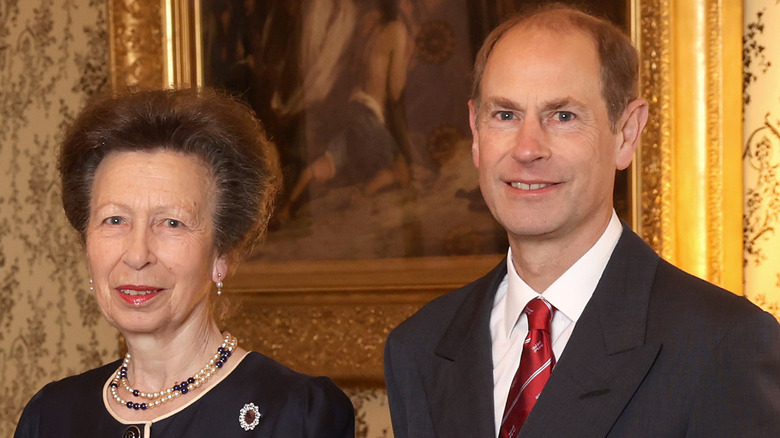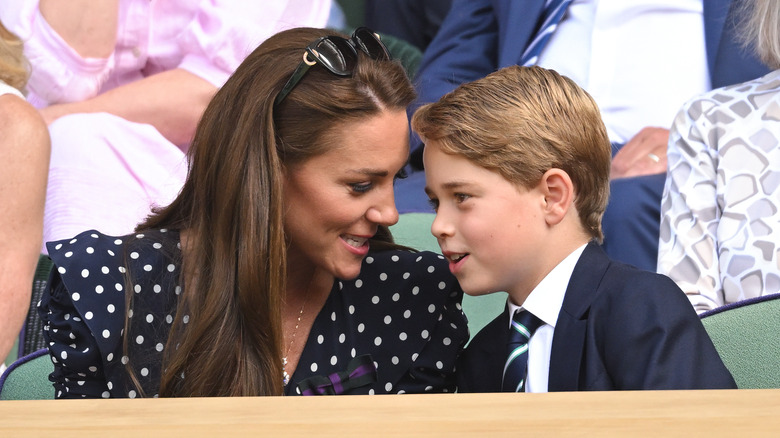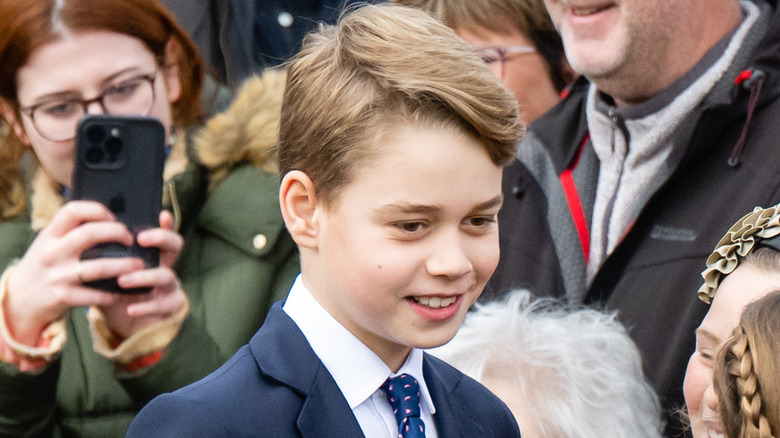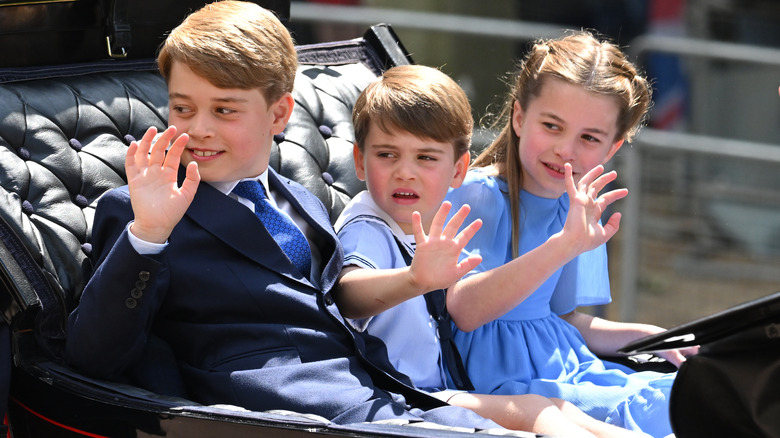What Will Happen If Prince George Becomes King Before Age 18?
Everyone knew the monarchy would be forever changed after Queen Elizabeth II died in 2022. What we didn't anticipate, however, is having two senior royals diagnosed with cancer within less than a year after King Charles III's coronation. Many have speculated about what Charles' cancer diagnosis would mean for the monarchy, and the press had barely run out of stories to publish about the king's health when Princess Catherine announced that she, too, had been diagnosed with cancer. This sent shockwaves throughout the world, and instead of speculating about how Prince William and Catherine might have handled the situation if Charles could no longer fulfill his royal duties, the press and the public turned their attention to Prince George in the wake of his mother's diagnosis, wondering what would happen if the young royal had to become king.
It's a rather frightening thought. If George found himself in the position of having to take on the role of monarch, it would mean that, by some tragic turn of events, both Charles and William could not fulfill their duties. While it's said that George's 10th birthday marked the moment he started to understand his future as The Crown, taking on this role unexpectedly would no doubt be a big adjustment for the young prince. Since Princess Catherine's shocking cancer announcement, all eyes have been on George, and speculation is rife about what could happen if he becomes the new monarch before he turns 18.
Prince George would become the new monarch but wouldn't take on any official duties
The notion of having a child take on the role of a monarch seems ridiculous in this day and age. Of course, in the past, things worked a little differently, and child monarchs, while rare, did exist. Before Scotland and England's kingdoms merged in 1707, there were two child monarchs: Lady Jane Grey, Henry VII's great-grandaughter, was England's monarch for all of nine days in 1553. She was executed in 1554 at the age of 17. Scotland's King James VI, who later became known as James I of England, became king when he was only 13 months old.
So what happens when a child ascends the throne? Well, in Prince George's case, he would be known as the King of England, but he wouldn't undertake any official royal duties. Instead, one of the senior members of the royal family will shoulder the monarch's responsibilities on his behalf. This person will be known as the regent.
Hopefully, this isn't a scenario in which the British monarchy will ever find itself. Royal author Robert Hardman told the Mirror that Prince William and Princess Catherine are doing everything in their power to equip George for his future role. Palace veterans have said that despite George being prepped for his future role as king, his parents would like to delay his official duties until he's "well into his twenties."
A regent would be appointed
Should the unthinkable happen and Prince George find himself ascending the throne before he turns 18, royal protocol dictates a regent would be appointed to fulfill the young monarch's duties until he comes of age and has the capacity to shoulder the responsibilities that come with being the king of England.
The Regency Act was established by the British parliament in 1937 and stipulates that a regent can be appointed in a few scenarios, one of which is when a monarch under the age of 18 ascends the throne. Other instances covered under the Regency Act are when the monarch becomes unable to fulfill their duties due to illness or other limitations, or when they are abroad for an extended period of time.
The most prominent regency occurred in the 19th century when King George III was declared incapable of fulfilling his royal duties due to his declining mental health. In George III's case, his son, also named George, became Prince Regent and only ascended the throne when his father died. While regents hold plenty of power, there are some things they cannot do, such as alter the line of succession. The regency usually falls to the person who is next in line to the throne, given they are 21 or older. This means if George becomes king before the age of 18, his younger siblings can't become regent and the role will fall to one of the other senior members of the royal family.
Prince Harry might become regent, but it's complicated
If Prince George becomes king before he turns 18, the Regency Act stipulates that the person next in line to the throne who is 21 or older should become regent. In George's case, the regency could not fall to any of his siblings, since they are both younger than him. The person next in line to the throne who qualifies as regent would then be Prince Harry. But, as we all know, Prince Harry's abrupt exit from the royal family in 2020 makes all of this way more complicated.
Even though Harry would be regent, the Regency Act stipulates that the prince must be domiciled in the United Kingdom to take on this role. Domicile refers to a person's permanent residence, so even though Harry is currently living in the United States, his domicile remains the U.K., unless he becomes a permanent U.S. resident. In April 2024, Harry sent paperwork to the palace stating that he is "usually resident" in the U.S. But immigration experts told the Mirror that "usually resident" doesn't mean the prince has been granted permanent residence.
This technically means that Harry could still become regent if he returned home. If not, the regency would fall to Prince Andrew, whose controversial friendship with convicted sex offender Jeffrey Epstein makes him a less than favorable choice.
Princess Anne and Prince Edward might step into the roles of counsellors of state
When King Charles III became the new monarch, he petitioned parliament to amend the Regency Act to allow other members of the royal family to step in as counsellors of state should he become temporarily incapacitated. To be clear, counsellors of state and regents aren't the same thing. A regent is appointed when the monarch becomes permanently incapacitated or if they are underage. The Regency Act stipulates that only those down the line of succession can step into the role of regent. Counsellors of state, however, are appointed when the monarch is temporarily incapacitated and they don't necessarily need to be individuals who are potential successors to the throne.
Previously, the role of counsellors of state would have fallen to Prince Andrew or Prince Harry. With the amended Act, however, the responsibility will fall first to Princess Anne and Prince Edward before Andrew and Harry are considered. This might mean that if Prince George becomes king before he turns 18 and Prince Harry is regent but finds himself temporarily unable to fulfill his duties, Anne or Edward would step into their roles as counsellors of state and temporarily run things in his absence.
Princess Catherine could provide support, but she won't be allowed to become regent
Many have posed the question of whether or not Princess Catherine would be allowed to step in as regent should Prince George become king before he comes of age, and the answer is a definite no — unless the Regency Act is significantly amended in the near future.
While Catherine is the queen-in-waiting, she is not a direct descendant of the royal family, which means the Regency Act excludes her completely. There's a whole slew of royal family members in the line of succession who can step up as regent should Prince Harry decide not to return to help out the family. Still, many of these royals aren't even working members of the monarchy, and Catherine would likely have a lot more experience running things than they do.
Many seem to have considered this, with Politico speculating whether or not parliament might amend the Regency Act to include Catherine as a possible regent should tragedy strike. This, of course, cannot be ruled out completely, seeing as parliament amended the Act to accommodate King Charles III's choice of counsellors of state. Regent or not, Catherine would remain a member of the monarchy, should something happen to Prince William. She would most likely continue to support Prince George and prepare him for his duties as monarch and play a key role in the kind of king he becomes.
George will likely be prepared for his royal duties if he becomes king before the age of 18
When the time comes for Prince George to ascend the throne, he'll be ready. At least, that's what royal author Robert Hardman told People. According to Hardman, George's childhood is very different from King Charles III's as he is being eased into the idea of one day becoming the monarch instead of simply being told his destiny. William likely has this approach because Charles allowed him more freedom. According to Hardman, William and Catherine want to make sure George doesn't find the prospect of becoming king scary. "There's a belief to make it as unobtrusive and as normal — if you can call it normal — and as pleasant as possible," Hardman told People.
In his book "Charles III: New King. New Court," Hardman claims that Prince William is taking his responsibility of raising the future king of England very seriously. "In his view, it's not far off the most important job he has — raising the next king," a family friend of William's claimed in Hardman's book "The Making of a King."
In "Charles III: New King. New Court," Hardman notes that previously, monarchs didn't specifically receive training for the role they would one day take on, and William has taken it upon himself to do this with George so that he can be prepared when the crown passes to him.
George could choose to forfeit his role as monarch entirely
While abdication is likely considered a dirty word in the royal family's vocabulary, Prince George could decide to forfeit the crown when it passes to him. Queen Elizabeth II's uncle, King Edward VIII, was the last British monarch who abdicated the throne. He ended his reign in 1936 after getting engaged to Wallis Simpson, who was a divorcée. With no children to take his place, the crown passed to his brother, King George VI, who then passed it on to his daughter, Queen Elizabeth II.
Since falling in love with and marrying a less-than-ideal partner in the eyes of the monarchy no longer disqualifies one from being the monarch, we can assume that Prince George won't abdicate because of the person he loves. Of course, the possibility remains that he might not want to be part of all the pomp and circumstance. If he chooses to step back from the monarchy to lead a quieter life like Prince Harry, he would have the freedom to do so, and the crown would pass to his sister, Princess Charlotte.

